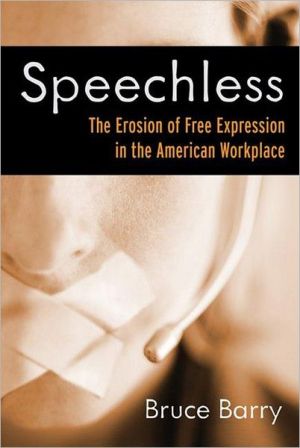

 |

|

The average rating for Speechless: The Erosion of Free Expression in the American Workplace based on 2 reviews is 3.5 stars.
Review # 1 was written on 2007-08-19 00:00:00 Xenia Henrie Xenia HenrieDocuments the legal conflict that severely limits United States workers' freedom of expression (speech, writing, and other actions): codes that should protect individual expressivity on the constitutional level, but at the state level give employers wide latitude in controlling all actions in the workplace. Although most Americans believe they have expressive rights, uncertainty about the extent of these rights at work creates what Barry describes as a "chilling effect"'not only on the job but also in employees' private lives. Speechless recounts numerous and diverse legal cases from the termination of a factory worker for her John Kerry bumpersticker, to a Teamster dismissed by his union for refusing to commit perjury, to a Microsoft employee fired over a photo on his personal blog showing his company's use of Apple computers. Throughout, Barry identifies two critical factors'at-will employment and workers' lack of due process in terminations'that create a climate in which workers rightfully fear for their livelihoods. Although union activists, labor lawyers, and scholars in the field will not be surprised, the number of accounts of workers fired for outside-of-work expression in Speechless is sobering for the rest of us. However, contrary to the historical decay of workers' expressive rights implied in the subtitle, Barry shows that such rights have only really been extended (albeit with significant exclusions) to government employees, and that the idea of them is pretty recent (postwar). The basic problem that Barry illuminates is employers' legal advantages that are based on two incorrect assumptions in the law: that employees and employers have equal power in the labor market, and that the (fairly toothless) National Labor Relations Board could possibly protect workers' expressive rights as well as corporations can compel employee expression in-house. In the end, though, Barry is concerned with more than just workers' ability to speak freely about their employers. He argues that freedom of expression at work matters because citizens' day-to-day lives are largely experienced at work. Barry theorizes a link between fear of reprisals for speaking (or blogging) one's mind about one's employer and the "chilling effect" on true democratic participation by working Americans. In contrast, Barry's brief comparison with protections for workers' expressive rights in European and British Commonwealth countries provides useful context in imagining how a successful economy could accommodate worker expression. Not only are workplace expressive rights necessary to a democracy, Barry argues, but they are compatible with a healthy GDP. Thus he urges three areas of policy reform: implementation of due process in workplace discipline and firing; at-will employment to be replaced with European-style "property rights" of workers to their jobs; and changes made in the law to specifically protect freedom of expression across the public and private sectors for matters that do not affect owners' and managers' control of efficiency and productivity in the workplace. Some readers will question Barry's social democratic assumptions: that owners and managers are indeed the best decision-makers in a workplace, or that capitalism and true democracy are not inherently conflictual. Others will find his First Amendment arguments familiarly annoying: a focus on the creation of legal codes such as free speech protections ignores their unequal application in a society stratified by class, ethnicity/race, and gender. We know, for instance, that due process in existing law is racialized in its actual practice; that not only firing but hiring is deeply gendered as well as racialized. Furthermore, given what Barry calls the current political "tilt," it's difficult to see how his proposed policy changes could be effected. |
Review # 2 was written on 2013-05-03 00:00:00 Donald Edmonson Donald EdmonsonFor this genre (employment law) I think the book was great. Difficult but readable words, probably graduate level. Organized nicely. I read this book being a new union steward. It gave me a nice foundation of worker versus employer rights. It was an enjoyable book to read, packed with useful, applicable info everyone can use today. |
CAN'T FIND WHAT YOU'RE LOOKING FOR? CLICK HERE!!!